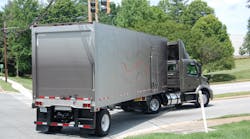Is regional haul the future of trucking? While it seems like most folks think about long haul when describing the trucking industry, the reality is that there has been growth in regional haul operations because of a variety of factors.
According to trucking industry sources, the length of haul has been decreasing for many years and regional haul operations have been growing. While regional freight moved by day cabs and sleeper tractors has always been a part of the trucking industry, it is an area that has not gotten a lot of recognition or attention
There is no set definition for regional haul, however in our recent report More Regional Haul: An Opportunity for Trucking, we define regional haul as an operation where the truck stays within a 300-mile radius of its home base. This may include trucks that return to a home base every day or ones on a route for multiple days but that stay within that 300-mile radius.
In preparation for Run on Less Regional we decided to take an in-depth look at regional haul operations to make sure we fully understand what is going on in this market segment.
Through our research for the report, here are some of the trends we see as impacting the continued growth of regional haul:
- Driver hiring and retention
- Growth in e-commerce
- The push towards immediate delivery
- Growth in GPS based asset tracking systems (tractor, trailer, load and driver)
- Advances in technologies such as electric and hybrid vehicles
- Vehicle automation
- Innovations in load matching systems
- Increased use of long combination vehicles
- Data collection and mining
- Vehicle specialization
We don’t see any of these trends going away any time soon and so expect regional haul operations to continue to become more important or at least get more attention as fleets try to improve the efficiency of that part of their operation.
The two biggest takeaways from the report revolve around drivers and alternative-fueled vehicles. Regional operations mean drivers are more likely to get home on a regular basis and that could help the industry with its driver recruitment and retention problem.
Regional operations are also fertile ground for alternative-fueled vehicles because by their very nature they make it easier for fueling infrastructure for vehicles that use an energy source other than gasoline or diesel fuel to be installed.
We’ll continue to monitor developments in regional haul operations, and through Run on Less Regional plan to showcase the best of the best when it comes to freight efficiency in this growing segment of the market.




